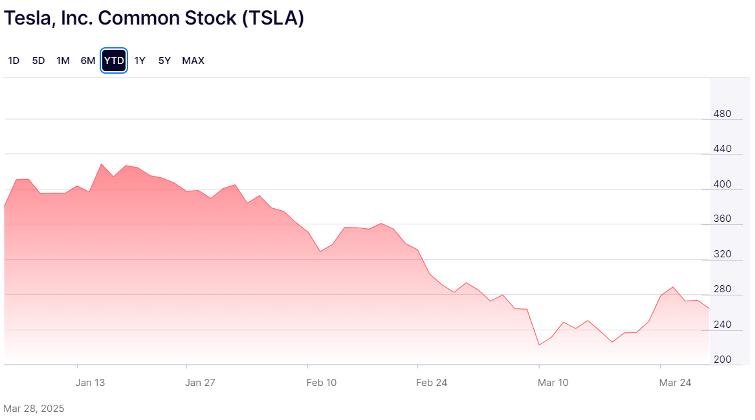Tesla Deep Dive: How the Past Year Shaped the Company
Date Written: 31st March 2025
Introduction
The past year has been a whirlwind, marked by many sharp declines and unexpected surges. But behind the face of volatility lies bigger questions: what is driving these shifts in price movements? Why are they happening? What impact will they have?
And perhaps most crucially - what do they reveal about the road ahead for Tesla?
(NASDAQ, 2025)
Recent Performance and Influencing Factors:
- Year-to-Date Decline: Tesla's shares have declined by nearly 25% in 2025, with a one-third reduction in market value since December. This downturn is attributed to political controversies, trade tariff threats, and indications of slowing electric vehicle (EV) demand. (The Times, 2025)
- Hedge Fund Activity: Hedge funds have increased short positions against Tesla, NVIDIA, and AMD, indicating a bearish outlook on these stocks. This trend reflects broader market pessimism following consecutive years of significant gains in the S&P 500. (Reuters, 2025; Business Insider, 2025)
- Tariff Implications: Despite President Trump's announcement of a 25% import tariff on all cars imported to the U.S., Tesla's stock price increased, shrugging off trade war fears. This resilience is due to Tesla's domestic manufacturing, which shields it from direct tariff impacts. However, CEO Elon Musk has cautioned about potential cost increases from sourcing some parts internationally. (Barron's, 2025)
- Retail Investor Behaviour: Individual investors have been actively purchasing Tesla shares amid market volatility, demonstrating a "buy-the-dip” mentality despite broader economic uncertainties and trade tensions. (Business Insider, 2025; The Times, 2025; Barron’s, 2025)
(Google Finance, 2025)
Elon Musk's Engagement, Involvements and Impacts
Elon Musk's Political Engagement:
- Political Associations: Musk's involvement with the Trump administration has led to a polarised perception of Tesla. While some analysts believe this association could open new market opportunities among conservative consumers, others express concern over potential alienation of Tesla's traditional, liberal-leaning customer base. (Business Insider, 2025)
- Diverse Opinions: The political landscape has influenced investor sentiment, with figures such as Commerce Secretary Howard Lutnick advocating for Tesla investments, while others, such as Minnesota Governor Tim Walz, advise against it. This division shows the increasing politicisation of stock market decisions. (MarketWatch, 2025)
Elon Musk's Political Involvement and Impact on Tesla
Elon Musk's active participation in political activities, notably his support for President Donald Trump during the 2024 election campaign, has had a multifaceted impact on Tesla's performance and perception:
- Market Valuation Surge: Following President Trump's election victory in November 2024, Tesla's market capitalisation surpassed $1 trillion. This surge was driven by invest or optimism regarding potential favourable policies for Musk's ventures due to his political alignment with the President. (The Guardian, 2025; Mint, 2024)
- Investor Concerns: Despite financial gains, Musk's political engagements have raised concerns among investors. Questions have emerged about the potential negative impact on Tesla's brand and sales, particularly regarding the CEO's public support for polarising political figures. (Axios, 2024)
Impact on Global Markets and U.S. Indices
How have Musk's political activities influenced broader market dynamics?
- Automotive Industry Tariffs: In March 2025, President Trump announced a 25% import tariff on all cars imported to the U.S., affecting global automotive markets. While companies like Ford and General Motors experienced stock declines, Tesla's domestic manufacturing allowed it to avoid the slump, with share prices rising due to its reduced exposure to import tariffs. (Barron’s, 2025)
- Market Volatility: The introduction of these tariffs contributed to increased volatility in global markets and U.S indices, as investors reacted to potential trade tensions and their implications for various industries.
Additional Data on TSLA Stock
Tesla's stock has experienced notable fluctuations influenced by political developments and market reactions, such as the following
- Post-Election Rally: In the week following the 2024 election, Tesla's stock gained 29%, adding over $230 billion to its market capitalisation, marking its best performance since January 2023. (Mint, 2024)
- Analyst Perspectives: Analysts have offered mixed views on Tesla's outlook. Some highlight the company's resilience amid political and market challenges, while others express caution due to potential risks associated with Musk's political involvement and its impact on Tesla's brand perception.
Implications for Elon Musk's Career and Influence
Musk's political engagement has had notable effects on his career and influence, but what are they?
- Enhanced Political Capital: His support for President Trump has potentially increased his influence in policy discussions, particularly concerning autonomous vehicle regulations. Reports suggest that the administration may fast-track regulations favourable to Tesla's self-driving initiatives. (Forbes, 2024; The Guardian, 2024)
- Brand Perception Challenges: Conversely, Musk's political stance has led to brand perception challenges. Some former Tesla supporters have sold their shares, citing dissatisfaction with his political activities and concerns about the company's direction. (WSJ, 2025)
Now that we have explored Tesla’s performance and future, what about its CEO?
An eccentric businessman who has recently become more politically involved. With a dominating role in the U.S. Department of Government Efficiency, he has sparked plenty of controversy online through social media platforms, searing his name into our minds from his constant media appearances.
(Stock decline timeline created on TradingView by @amenalalagul)
"Death" of the Celebrity CEO?
1. Stock Market Decline and Investor Scepticism
- Tesla's stock has fallen by nearly 30% in 2025, wiping out a third of its market value since December.
- Hedge funds are increasingly shorting TSLA, signalling growing scepticism about Tesla's trajectory under Musk's leadership.
- Musk's polarising political affiliations have led to some institutional investors distancing themselves from Tesla, citing concerns over brand damage.
2. Brand Perception and Consumer Backlash
- Musk's alignment with the Trump administration has alienated a portion of Tesla's core customer base, traditionally associated with progressive, climate-conscious consumers.
- While Tesla remains a leader in EVs, competition is growing, and Musk's personal brand, once a key asset. is now a double-edged sword.
3. Shifting CEO Expectations
- The market is moving towards "quiet leadership", where investors prioritise operational efficiency over personal branding.
- CEOs like Tim Cook (Apple) and Satya Nadella (Microsoft) have demonstrated that steady, strategic leadership can create long-term shareholder value without excessive media presence.
- Musk's increasingly controversial persona may be undermining Tesla's credibility in ways that were not a concern in the past.
The Evolution, Not Death, of the Celebrity CEO?
1. Political Influence as a New Form of Power
- Musk's ties to the Trump administration could lead to regulatory advantages for Tesla, particularly in autonomous vehicle policies and infrastructure spending.
- His ability to influence government policies may allow Tesla to outmanoeuvre competitors, even if his public image takes a hit.
2. Resilient Retail Investor Support
- Despite the volatility, retail investors continue to buy the dip demonstrating faith in Musk's long-term vision, Musk's cult-like following on social media remains strong, and his ability to engage retail investors directly is an asset most CEOs lack.
3. Tech Visionary Status Remains Intact
- Tesla's dominance in Al, battery technology, and autonomous driving keeps Musk at the centre of technological innovation.
- Beyond Tesla, Musk’s influence – spanning companies like SpaceX, Neuralink and Starlink – reinforces his image as a tech visionary, ensuring his continued relevance in the ever evolving innovation landscape.
Bottom Line: We are Witnessing A Shift - Not a Death.
Musk's growing political engagement marks a fundamental shift in what it means to be a celebrity CEO. The era of the admired, eccentric tech genius may be coming to an end. He is not disappearing, he is evolving into a figure of political and strategic influence.
However, this transformation comes at a cost.
His polarising political stance risks Tesla's brand and investor confidence. The company may require a strong operational leader (like Tesla's CFO or a merging executive) to reassure Wall Street and provide balance and stability.
The days of unchallenged enthusiasm or Musk's leadership may be fading replaced by a more pragmatic assessment of his strengths and weaknesses.
Ultimately, rather than witnessing the death of the celebrity CEO, we are seeing the transformation of Elon Musk from an admired tech mogul into a politically tangled business figure. Whether this transformation benefits Tesla in the long run remains uncertain - but one thing is clear:
Musk is not stepping out of the spotlight anytime soon.
In summary, Tesla's stock performance has been shaped by a complex interplay of political affiliations, market dynamics, and investor sentiment. Elon Musk's increasing (and continuously so) political engagement has significantly influenced investor confidence, regulatory expectations, and Tesla’s brand perception.
While his alignment with the current administration has created potential policy advantages and favourable share price movements, it has also exposed the firm to increased market volatility and reputational challenges. As a result, Tesla’s market position continues to fluctuate, reflecting the broader uncertainties surrounding Musk’s evolving role as both a business leader and apolitical figure.





.jpeg)
.jpeg)
.jpeg)
.jpeg)
.jpeg)
.jpeg)
.jpeg)
.jpeg)



















